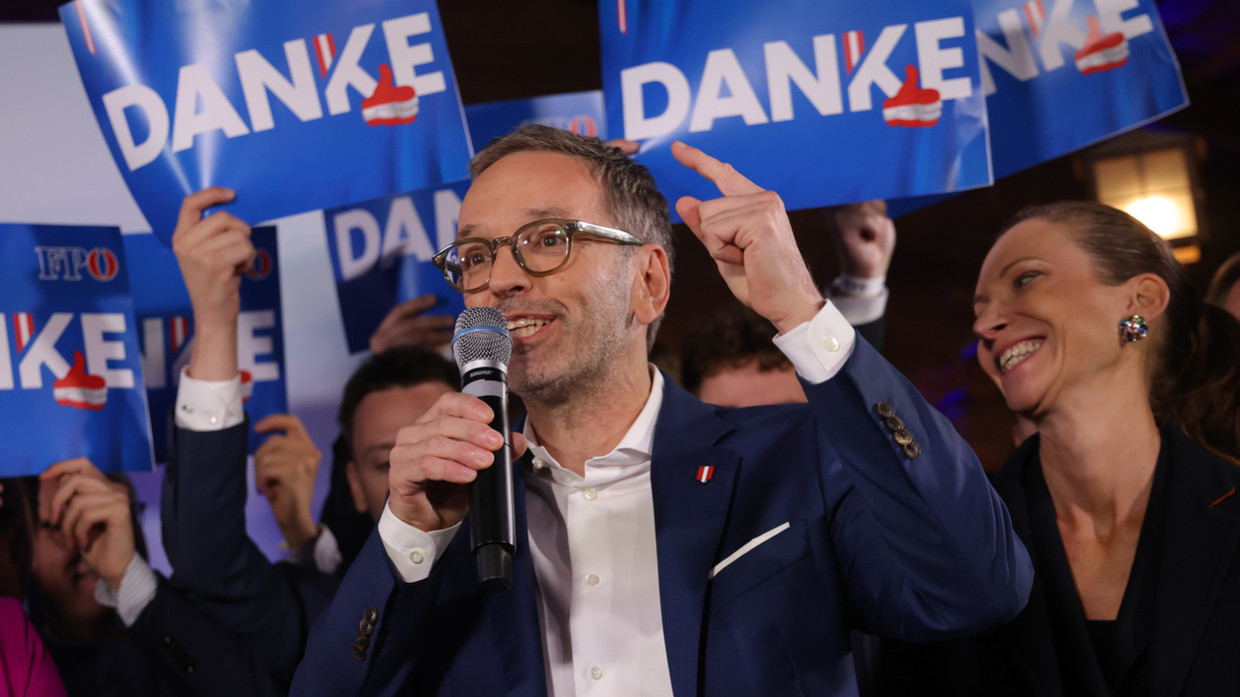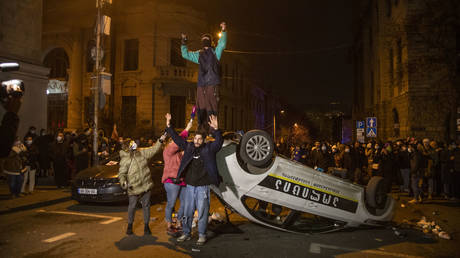Another right-wing anti-establishment party has just won the popular vote in yet another European nation, this time the Austrian parliamentary elections. But as long as the establishment elites can still figure out how to keep themselves in power by clinging to one another despite their nominal ideological differences, they really don’t care. It sounds like a brilliant strategy. Let’s see where it goes, shall we?
The elites in Austria, like elsewhere in Europe, see it as their duty to defend democracy by ensuring that the party that gets the most votes gets completely sidelined. Why? Because, Hitler. Duh.
According to the Associated Press, Austria’s Freedom Party secured the “first far-right national election win since World War 2.” And we all know which famous Austrian is synonymous with the Second World War. How subtle.
“EU rocked as far-Right party founded by Nazi WW2 veterans storms to victory,” noted one British tabloid, the Express. “Herbert Kickl’s Freedom Party is on for a huge victory in Austria according to early projections.” Interesting how Nazi history is omitted entirely when Ukraine’s neo-Nazi Azov movement runs around with Nazi symbol flags and tattoos to kudos from the same establishment.
For those looking for a different way to smear Austrian voters other than comparing them to Hitler, there’s apparently also the opportunity here to compare them to the Führer’s World War 2 enemies: Russia. NBC is calling this “far-right” vote by average Austrians fed up with the establishment’s antics a “boost for Putin.”
Looks like all the “bad guy” bases are covered across the entire spectrum of Western establishment propaganda.
So how did this party actually win? The former Austrian minister who took the helm of the Freedom Party in 2021 constantly spoke of the average citizen suffering from an inability to pay for basic life necessities, like electricity and food. Doesn’t he understand that if Austrians are able to put food on the table, then Putin wins? Apparently not. And it doesn’t seem like voters get it either. And since this this guy and his party are increasingly resonating with voters’ objective reality while the elites dissociate from it, it’s translating into electoral wins.
It’s as simple as voters taking a look around at their lives and coming to the conclusion that his assessment aligns with their own more than the version presented by the establishment parties.
Another big issue for Austria has been the large number of refugees per capita, one of the highest in Europe, with the issue resonating through incidents like the Islamic State threats to the Taylor Swift concert in Vienna over the summer, police raids ahead of the anniversary of the September 11, 2001 terror attacks in the US, and refugee riots on Halloween a couple of years ago.
The asylum issue in particular is one that Kickl, the former interior minister who now leads the Freedom Party, would be well-positioned to tackle. What exactly about his past could possibly qualify him for that in the minds of voters? Maybe the fact that he was forced to step down from the job in 2019 for saying that he wanted to test the parameters of European human rights rules that “prevent us from doing what’s necessary” with asylum seekers – a subject that even the establishment left had to admit was an issue, but only saying that they’d merely reduce asylum applications. There’s considerable daylight between the positions of “we’re full” and “get out”, with the latter already being the actual position staked out by the so-called bleeding heart leftists, who only managed to get 21% of the vote.
Obviously a large number of Austrians didn’t clutch their pearls at Kickl’s remarks like the Austrian establishment did, awarding him nearly 29% of the popular vote. Kickl has called Ursula Von der Leyen, the unelected European Commission president, a warmonger. And, well, Austrian voters also handed his Freedom Party the most votes in the European parliamentary elections earlier this year. Nice little throne-warming gift, there.
The party’s mandate from voters seems clear: to take on the national and European establishments that have made such a mess of things. Just like everywhere else in Europe where anti-establishment parties have been surging, particularly on the right. So who are they going to form a government with, in respect of the people’s choice? According to the establishment-right chancellor, no one. Because, well, screw them.
“I have made it clear with whom it is not possible to form a responsible, sustainable government. The current leader of the FPO does not meet these criteria, so I excluded him,” Chancellor Karl Nehammer said. His own center-right establishment party came in second with 26% of the vote, but coupled with the center-left, they can still cling to power.
All of the other Austrian parties have said that they’ll join the chancellor at his lunch table in the cafeteria and leave the Freedom Party alone in the corner like a Billy No Mates, because it’s not like this is supposed to be a democracy where the popular vote matters, or anything. The country’s president has also said that he doesn’t have to give the party with the most votes the first crack at forming a government. Guess he figured that he has to save democracy by placing it on a raft and watching it float away like Jack did with Rose in Titanic.
The chancellor apparently feels the need to protect the country from its own people. Just like French President Emmanuel Macron tried to do recently with electoral manipulations so numerous and exhausting that they could have been a new endurance sport at the Paris Olympic Games. It would have been straight up election-stealing collusion had it been done behind closed doors. They did it in full view of the public instead.
Macron pitched a fit when the populist right won the European vote, and called an election right afterwards that resulted in the populist right winning the popular vote and the populist left winning the most seats, thanks to Macron’s party’s deal with the left to withdraw strategically in favor of a single candidate between the two parties in districts where the right-wing National Rally risked winning as a result of vote splitting.
It turns out that Macron actually wanted neither party to actually form government, so he handed the role of Prime Minister to the EU’s Brexit negotiator, technocrat Michel Barnier, of the center-right establishment party that was widely rejected by voters and reduced to single digits in the election. The new French government represents an attempt to represent populist right and left positions, but with ministers who aren’t actually from the parties that voters chose.
In recent German state elections, blocking the populist right, which won two of the three votes, has also been the name of the game for those who apparently consider the popular vote roadkill that can just be scraped off the wheels of their clown car before carrying on.
So what’s next for European democracy? How about just leaving the same establishment hacks in power in perpetuity and just having the plebes vote on an agenda for them to carry out. Because that’s almost where we’re at right now.
For the average European voter, it’s all about the economy, cost of living, migration, and knocking off all the bellicosity that’s enriching special interests while impoverishing the average citizen. A handful of politicians have figured it out. Because it really isn’t rocket science. “Populist,” these days just means having your eyes and ears open, which you can only do if your head isn’t jammed up Uncle Sam’s backside. Maybe – just maybe – that basic awareness is what’s so appealing to voters with these so-called far-right policies – and not, you know, Hitler.
The statements, views and opinions expressed in this column are solely those of the author and do not necessarily represent those of RT.



